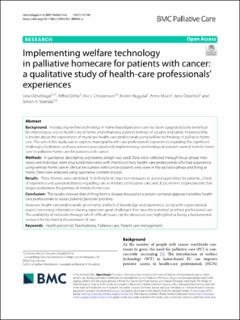Implementing welfare technology in palliative homecare for patients with cancer: a qualitative study of health-care professionals’ experiences
Oelschlägel, Lina; Dihle, Alfhild; Christensen, Vivi L.; Heggdal, Kristin; Moen, Anne; Österlind, Jane; Steindal, Simen Alexander
Peer reviewed, Journal article
Published version
Permanent lenke
https://hdl.handle.net/11250/2978276Utgivelsesdato
2021Metadata
Vis full innførselSamlinger
- Artikler / Articles [1185]
- Publikasjoner fra CRIStin [1132]
Sammendrag
Background: Introducing welfare technology in home-based palliative care has been suggested to be benefcial for improving access to health care at home and enhancing patients’ feelings of security and safety. However, little is known about the experiences of municipal health-care professionals using welfare technology in palliative home care. The aim of this study was to explore municipal health-care professionals’ experiences regarding the signifcant challenges, facilitators, and assessments associated with implementing a technological solution named “remote home care” in palliative home care for patients with cancer.
Methods: A qualitative, descriptive, exploratory design was used. Data were collected through focus-group interviews and individual semi-structured interviews with interdisciplinary health-care professionals who had experience using remote home care in clinical encounters with cancer patients who were in the palliative phase and living at home. Data were analyzed using qualitative content analysis.
Results: Three themes were identifed: 1) shifting from objective measures to assessing priorities for patients, 2) lack of experience and personal distress regarding cancer inhibits professional care, and 3) prominent organizational challenges undermine the premise of remote home care.
Conclusion: The results showed that shifting from a disease-focused to a person-centered approach enables healthcare professionals to assess patients’ personal priorities. However, health-care professionals’ uncertainty and lack of knowledge and experience, along with organizational issues concerning information-sharing, represent great challenges that have the potential to inhibit professional care. The availability of networks through which difcult issues can be discussed was highlighted as being a fundamental resource for facilitating the provision of care.
Beskrivelse
This article is licensed under a Creative Commons Attribution 4.0 International License, which permits use, sharing, adaptation, distribution and reproduction in any medium or format, as long as you give appropriate credit to the original author(s) and the source, provide a link to the Creative Commons licence, and indicate if changes were made. The images or other third party material in this article are included in the article’s Creative Commons licence, unless indicated otherwise in a credit line to the material. If material is not included in the article’s Creative Commons licence and your intended use is not permitted by statutory regulation or exceeds the permitted use, you will need to obtain permission directly from the copyright holder. To view a copy of this licence, visit http://creativecommons.org/licenses/by/4.0/. The Creative Commons Public Domain Dedication waiver (http://creativeco mmons.org/publicdomain/zero/1.0/) applies to the data made available in this article, unless otherwise stated in a credit line to the data

